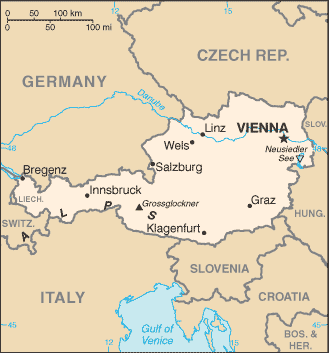
Over the years, Austria has been facing much adversity as a nation. Various professionals seem to be expecting much more productivity out of a country with such a high reputation. However, no one can denounce these opinions because currently Austria is considered a first world country that continues to face major setbacks in becoming a further stabilized nation. With this in mind, what can be the fundamental cause or several underlying causes of its numerous social, political, and environmental problems? Can the setback, or setbacks, lie within the notable annexation with Germany during the world wars, or did the impeding factors emerge after Austria became an independent nation?

Lingering effects from Communist rule is quite a possibility when dealing with a nation that had such close ties with a powerhouse house nation such as Germany. During the era of the world wars, European nations dealt with incredible changes that corrupted any sort of productive movement towards independency. Globalization of Austria was halted due to Germany’s total command of the region. Austria maintained little to no control over their domestic issues which led to far greater troubles in the long run. Today, we can see these issues on much greater levels partially due to the insufficient priorities they set within their nation. The mix ups in priorities can be seen within major intraregional problems such as the inability to regain religious stability within their nation following the ban of organized religion under Communist rule. With more than 75 percent of Austria practicing Roman Catholicism today, can solutions be reached through a unified persistence of finding proper, religious-minded solutions to the nation’s various disputes?
David N.




I believe that the issues of Austria lie in the period between post-Nazi rule and admittance into the European Union. During this period of reorganization and reconstruction, Austria faced rapid growth that proves to be harm today. One example is agriculture. Over usage in land has led to large amounts of deforestation and soil erosion. Industrialization has led to large amounts of water, air, and soil pollution. As well, the workers that drove the economic growth that made Austria one of the wealthiest countries in the world are now too old to be able to work. In general, Austria's problems are due to their previous focus on the present, which was the 1960's, rather than the future.
ReplyDeleteAlthough religion could play a role in combating the problems and conflicts of Austria, it would be difficult. If Christian values played a role in politics, this could create a larger conflict within the country. While a large percentage of voters may accept an integration of politics and religion, there is a possibility a large number of people may be angered in the way the government is run, seeing it as a theocracy rather than a democracy. The better way would be to consider how Christian teachings could be intertwined with the Austrian lifestyle. This would be done by viewing each solution to the problems in the country, and then considering how each solution would benefit all the people of Austrian rather than each particular group. For example, with the issue of immigration. Currently, many Austrians are against the idea of open immigration within the country. However, being part of a larger community, the European Union, the citizens of Austria need to be open to their neighbors and be willing to accept their strong economy should be shared with other countries.
Yes Religion may not be the answer but belief in the possibility of stability is key.75% is a huge percentage to follow Roman Catholicism and if so, the country should have no problem finding its way to prosperity. For the social aspect religious answers are easy to find but hard to enact. the problems today in austria directly relate to teens and poor habits forming in early childhood. these can be stopped before they get started with religion. Environmental problems are directly related to pollution from a variety of sources and is mainly a matter of government taking control and enforcing its laws. Political turmoil was recently avoided in austria but the lurking naziism is still an impending threat on society but the people have shown that they want to stay away from that evil past alliance.
ReplyDeleteCompromise is the key that moves us all along. With this in mind, it is imperative to know that while statistics do provide a plethera of knowledge in a timely manner, people are simply more then numbers.
ReplyDeleteWhile 75% of the Austrian population may abide by Christian beliefs and guidlines, the remaining 25% cannot be forgotten. Imposing that everyone would be willing to follow Christian guidelines would stir a feeling a discontent and only lead to feuding.
As already proposed by Chris Zega, I feel that while Government and Religion should always be kept seperate, that in some ways Religion and Austrian culture could slowly be mingled together.
An important part of the whole process would be to examine if that 75% of the population actually does follow Christian beliefs, and simply do not just call themselves Christian. Following the set of Christian beliefs, studies can be seen if high rates in smoking, drinking, and suicide decreas as a result of stemming down Christian beliefs.
In addition to Muffin Man's comment, the 25% of people in Austria who do not follow Catholicism ust be taken into account if any progress is to be made in Austrian society. True, much of this 25% is still Christian, but there are still 12% who don't practice any religion, 5% who are unspecified, and 4% who are Muslim. Yes, religion can be used a tool for social reform (and has also been the cause of it) but using the principles followed by most is not good enough for all.
ReplyDeleteĐơn vị nhận order trang sức trung quốc giá rẻ
ReplyDeleteĐơn vị nhận order phụ kiện quảng châu giá rẻ
Đơn vị chuyên đặt mua quần áo Hàn Quốc ở tại Hà Nội – TPHCM